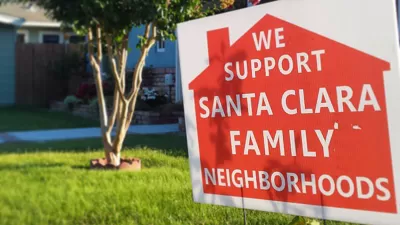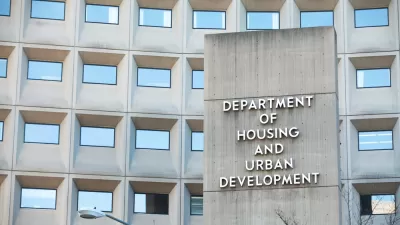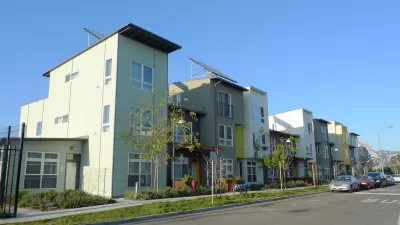Amendments are circulating for one of the most-closely watched, and passionately debated, pieces of housing legislation in the country.

California State Senator Scott Wiener announced last week a series of amendments to SB 827, the centerpiece legislation in a housing reform package that could upend the planning and development process in the state of California.
In response to a steady stream of engagement—some positive and some critical—Senator Wiener writes in a blog post that he has announced the amendments mostly to address concerns about displacement and affordability. Wiener also predicts that there will likely be more amendments to come.
For background, the crux of SB 827, as proposed in January by Wiener and co-authors Assemblymember Phil Ting and Sen. Nancy Skinner, is a new mandate for housing density along high-frequency transit corridors. The law amounts to a massive shift of land use control to the state level in an attempt to address the state's ongoing housing crisis through supply-side methods. The public conversation launched by the proposed legislation has been constant and heated, even inspiring voices from across the country to chime in. The proposed law was always going to be amended—the question now becomes whether the law can marshal enough political support to pass the State Legislature. The amendments, therefore, attempt to shore up concerns about loopholes and bring opponents over to support the law.
The first amendment addresses one of the most commonly cited concerns about demolition. The new amendment "explicitly defers to and preserves local demolition controls and limitations, meaning that if a local community restricts or bans demolitions, SB 827 will not change that local determination."
The second also provides special protections to rent controlled housing. In addition to deferring to local rules that ban demolition of rent controlled housing, "if a local community does allow demolitions of rent-controlled housing, SB 827 bans such demolitions for SB 827 projects unless the city council certifies via resolution that it will review demolition permits for rent-controlled housing, outlines the process by which those reviews will occur, and certifies that any demolition permit issued will have a Right to Remain Guarantee for tenants."
The third amendment provides a Right to Remain Guarantee for any tenants affected by demolitions of renter-occupied buildings, along with financial support while demolition and construction is under way. The fourth and fifth amendments explicitly allow for local inclusionary zoning laws to stay in place, applying local laws to SB 827 projects. A final amendment clarifies that parcels subject to upzoning due to SB 827 will be determined by proximity of a quarter mile to a transit stop—not a transit corridor.
FULL STORY: SB 827 Amendments: Strengthening Demolition & Displacement Protections

Study: Maui’s Plan to Convert Vacation Rentals to Long-Term Housing Could Cause Nearly $1 Billion Economic Loss
The plan would reduce visitor accommodation by 25,% resulting in 1,900 jobs lost.

North Texas Transit Leaders Tout Benefits of TOD for Growing Region
At a summit focused on transit-oriented development, policymakers discussed how North Texas’ expanded light rail system can serve as a tool for economic growth.

Using Old Oil and Gas Wells for Green Energy Storage
Penn State researchers have found that repurposing abandoned oil and gas wells for geothermal-assisted compressed-air energy storage can boost efficiency, reduce environmental risks, and support clean energy and job transitions.

Private Donations Propel Early Restoration of Palisades Playground
Los Angeles has secured over $1.3 million in private funding to restore the Pacific Palisades playground months ahead of schedule, creating a modern, accessible space that supports community healing after recent wildfires.

From Blight to Benefit: Early Results From California’s Equitable Cleanup Program
The Equitable Community Revitalization Grant (ECRG) program is reshaping brownfield redevelopment by prioritizing projects in low-income and environmental justice communities, emphasizing equity, transparency, and community benefits.

Planting Relief: Tackling Las Vegas Heat One Tree at a Time
Nevada Plants, a Las Vegas-based nonprofit, is combating the city’s extreme urban heat by giving away trees to residents in underserved neighborhoods, promoting shade, sustainability, and community health.
Urban Design for Planners 1: Software Tools
This six-course series explores essential urban design concepts using open source software and equips planners with the tools they need to participate fully in the urban design process.
Planning for Universal Design
Learn the tools for implementing Universal Design in planning regulations.
Ascent Environmental
Borough of Carlisle
Institute for Housing and Urban Development Studies (IHS)
City of Grandview
Harvard GSD Executive Education
Toledo-Lucas County Plan Commissions
Salt Lake City
NYU Wagner Graduate School of Public Service





























